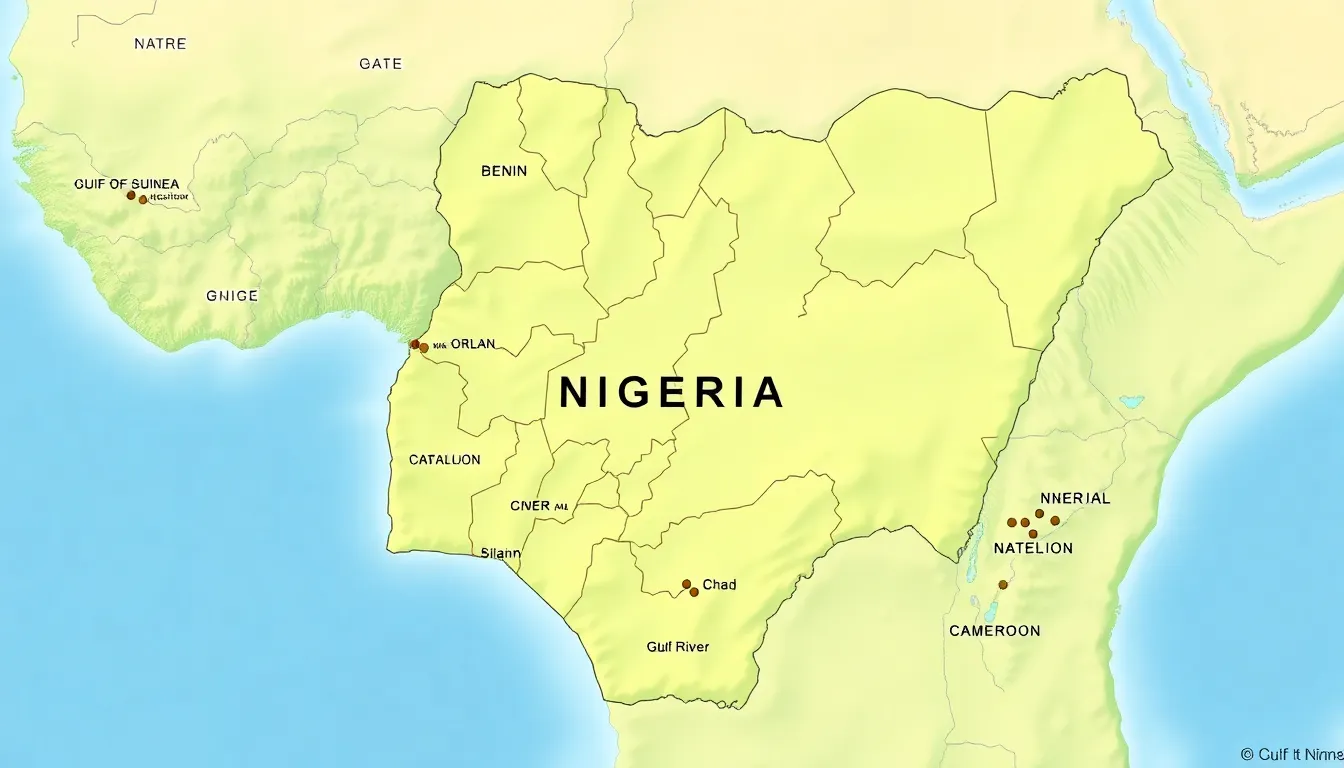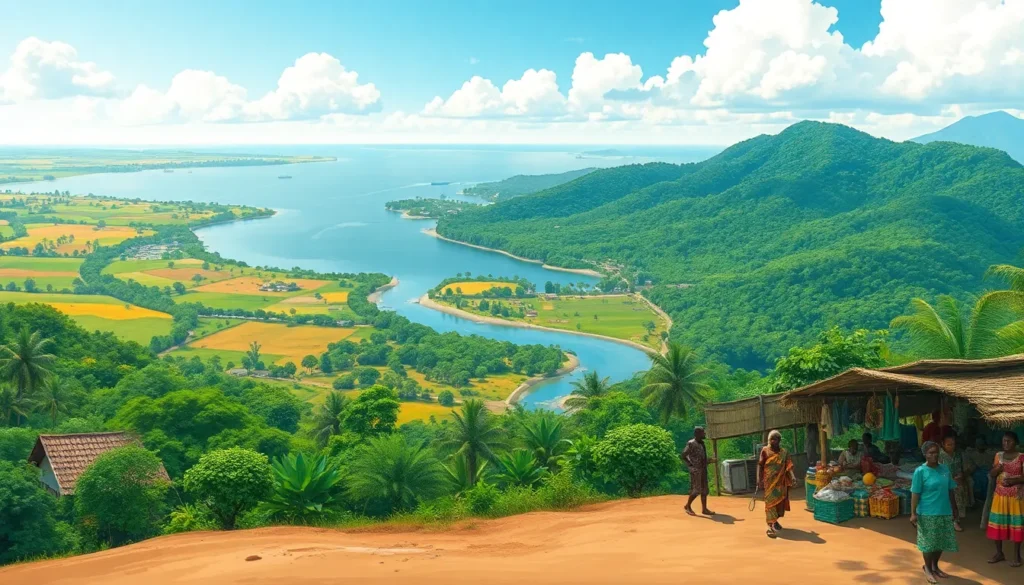Table of Contents
ToggleNigeria, often referred to as the “Giant of Africa,” is a vibrant country bursting with culture, history, and a dash of chaos that keeps life exciting. But where exactly can you find this dynamic nation on the map? Nestled on the western coast of Africa, it’s bordered by Benin, Niger, Chad, and Cameroon. If you squint hard enough, you might just spot it right next to the Gulf of Guinea, where the Atlantic Ocean waves cheerfully crash against its shores.
Overview Of Nigeria’s Geographical Location
Nigeria occupies a strategic location on the western coast of Africa. The country shares land borders with four nations: Benin to the west, Niger to the north, Chad to the northeast, and Cameroon to the east. It also lies along the vibrant Gulf of Guinea, which is part of the larger Atlantic Ocean.
The geographical coordinates of Nigeria range from approximately 4° N to 14° N latitude and 3° E to 15° E longitude. This position makes Nigeria one of the most accessible countries in West Africa, facilitating trade and cultural exchange. The landscape varies significantly across different regions, encompassing savannas, forests, and coastal areas.
Major rivers, including the Niger and Benue, flow through Nigeria, contributing to the nation’s diverse ecosystems and agricultural productivity. The Niger River, serving as the longest river in Nigeria, plays a crucial role in transport and sustains local communities.
Climatic conditions in Nigeria differ from the northern arid regions to the southern coastal areas’ tropical experiences. Rainfall patterns are distinct, with the south experiencing heavy rainfall from April to October, while the north faces a drier climate.
Nigeria’s geographical significance extends beyond its borders. Its location allows for interaction with various ethnic groups and cultures, fostering a rich tapestry of traditions and practices. As a result, Nigeria stands as a pivotal nation on the African map, integrating diverse influences and reinforcing regional connections.
Understanding Nigeria’s Borders

Nigeria shares its borders with four countries, positioning it strategically in West Africa. Benin lies to the west, providing vital trade links. In the north, Niger contributes to cultural and economic exchanges. Chad’s border to the northeast facilitates border trade, while Cameroon to the east adds to Nigeria’s diverse interactions. Each neighboring country enriches Nigeria’s landscape, influences its demographics, and fosters cross-border relationships.
Neighboring Countries
Nigeria is bordered by Benin, Niger, Chad, and Cameroon. Benin offers a cultural exchange that influences art and trade practices. Niger’s relationship focuses on agriculture and pastoralism. Chad’s interactions often revolve around resource management and economic cooperation. Cameroon’s proximity enhances regional security and collaboration on various projects. The borders reflect significant socio-economic ties that shape Nigeria’s cultural identity.
Key Geographical Features
Nigeria’s landscape showcases diverse geographical features. The Niger River flows through the country, providing essential water resources and fertile plains. The Benue River, a major tributary, converges with the Niger, enhancing agricultural prospects. Nigeria’s northern regions include the Sahel, characterized by arid conditions and grasslands. To the south, coastal areas along the Gulf of Guinea feature mangroves and beaches. Each feature contributes to the country’s ecological diversity and economic potential, impacting local communities.
Nigeria’s Place In Africa
Nigeria is a key country in West Africa, located within the larger African continent. It shares borders with four countries: Benin to the west, Niger to the north, Chad to the northeast, and Cameroon to the east. Each neighbor plays a significant role in Nigeria’s regional interactions, contributing to a diverse cultural landscape.
Positioned along the Gulf of Guinea, Nigeria benefits from access to the Atlantic Ocean. This geographical advantage facilitates trade and various economic exchanges. It enhances the country’s significance in maritime activities, allowing for international commerce with ease.
Geographical coordinates pinpoint Nigeria at approximately 4° N to 14° N latitude and 3° E to 15° E longitude. This specific location contributes to its varied climates, ranging from arid conditions in the north to tropical temperatures in the south. The mix of climates shapes vegetation and agricultural practices across the nation.
The Niger and Benue Rivers flow through Nigeria, providing essential water resources. These rivers create fertile plains that support agrarian communities, fostering economic activities. Regions around these waterways showcase rich biodiversity, contributing to the ecological fabric of the country.
Nigeria’s diverse ethnic groups thrive due to its geographical positioning. Close proximity to multiple borders encourages cultural exchange, enriching local traditions. The country’s intricate social dynamics reflect its historical connections, created through centuries of interaction with neighboring nations.
Importance Of Nigeria’s Location
Nigeria’s geographical location holds immense strategic and cultural importance in Africa. Positioned along the Gulf of Guinea, Nigeria serves as a bridge for trade and interaction between West Africa and the global economy.
Economic Significance
Nigeria’s location influences its economic landscape significantly. Access to the Atlantic Ocean facilitates maritime trade, enabling exports of oil, gas, and agricultural products. Proximity to neighboring countries enhances trade opportunities and strengthens regional markets. Roads and railways connecting Nigeria to Benin, Niger, Chad, and Cameroon further promote cross-border commerce. More than 40% of West Africa’s total GDP comes from Nigeria, highlighting its crucial role in regional economic stability. Trade partnerships with countries like Ghana and Togo also capitalize on this geographic advantage, driving economic growth in Nigeria.
Cultural Influences
Culturally, Nigeria’s strategic location fosters rich diversity. Interaction with neighboring countries contributes to a blend of customs, languages, and traditions. Ethnic groups such as the Yoruba, Igbo, and Hausa shape Nigeria’s vibrant cultural tapestry, reflecting influences from diverse African cultures. Festivals and events showcase this cultural amalgamation, drawing visitors from across the region. Exposure to different traditions cultivates a dynamic cultural environment, with art, music, and cuisine thriving. These cultural exchanges enhance national identity, promoting unity in diversity and showcasing Nigeria as a melting pot of influences.
Nigeria stands out as a pivotal nation in West Africa with its unique geographical positioning and cultural richness. Its strategic location along the Gulf of Guinea enhances trade opportunities and fosters cultural exchanges with neighboring countries. This dynamic interaction shapes Nigeria’s diverse identity and contributes to its economic growth.
The country’s varied landscapes and climates further enrich its ecological diversity and agricultural potential. With a vibrant mix of ethnic groups and traditions, Nigeria embodies a unique blend of influences that resonate throughout its society. As a key player in regional stability and cultural integration, Nigeria continues to thrive as a significant force in Africa.







